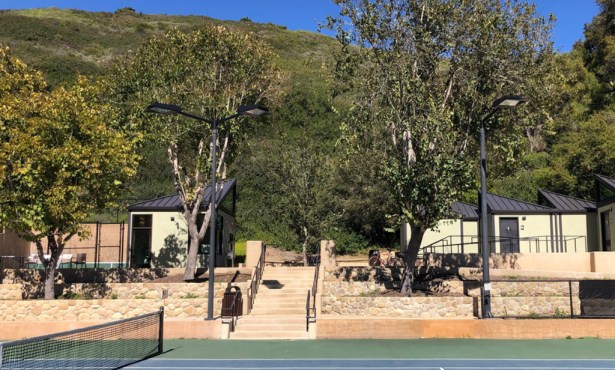Master of the Tabla
Planet Drum’s Zakir Hussain Waxes Poetic
by Charles Donelan
 Zakir Hussain is the world’s most
Zakir Hussain is the world’s most
renowned player and composer on the tabla, the traditional drum of
India. He has led a distinguished career on several continents, and
is particularly well-known for collaborating with such Western
bigwigs as the Beatles. He is a cofounder — with Grateful Dead
veteran Mickey Hart — of Planet Drum, a quartet of percussionists
that plays world music and won the first-ever Grammy for that genre
in 1992. The latest edition of Planet Drum will be appearing at the
Lobero Theatre on September 20. I recently spoke with Zakir
Hussain.
What’s been going on? I’ve been touring with Sangam [the group
is led by Charles Lloyd, and also includes Eric Harland]. We played
New York for the JVC Festival, then Turkey, Switzerland, France,
Belgium, and Greece. The Sangam live album on ECM was released in
April. [Incidentally, Charles Lloyd will be celebrating the 40th
anniversary of his Forest Flower recording on September 15 at the
Lobero with another group, this one featuring Geri Allen, Eric
Harland, and Reuben Rogers.]
How about Planet Drum? We will be doing something new when we
appear at the Lobero on September 20. We’ve grown a bit more as we
have become more exposed to each other’s musical traditions, and as
a result, the music has changed and evolved. Drumming generally is
at a new level, mostly due to the incredible communication that is
connecting drummers and drumming traditions from all over the
world. Planet Drum was a forerunner of this and remains a kind of
concoction based on all these changes. Mickey has been a leader and
a catalyst for world music from the beginning, and now that the art
of drumming has reached such an influential place because of
hip-hop and dance music, his role just looks more and more
impressive. He was chiefly responsible for this idea that there is
a “Planet Drum,” and that rhythm is universal. He didn’t invent the
concept, but he really was at the forefront of getting it out
there.
What exactly is going to be new about this version of Planet
Drum? We are actually embracing electronics and using computers
now. Not in the sense of drum machines or programmed drum tracks,
but as modifications and effects on top of our playing. We are
keeping our acoustic instruments, but we are going to run them
through some Mac G5s, which are going to be operated by another
person. The traditional drums will act as triggers for electronic
sounds. This is so that, for instance, a conga drum can be made to
sound like a bell. It’s all done in real time — no click tracks. We
will still be improvising spontaneously, and maintaining the
integrity of our original instruments, but through the G5s we will
be able to create a much broader palette. We will be using our
drums to make orchestral sounds.
That’s amazing. Where did you get into this? Well, Bill Laswell
and I have been doing things with electronics for years, and Mickey
and I are always looking for new ways to make the sound of Planet
Drum blossom. In the beginning, when I was first recording here in
the States, we would run a line to a speaker that was sitting out
in a field. Then there would be a tube that would take the sounds
back to the studio. That was our reverb!
Can you expand on your comment that drumming has evolved
recently? Sure. Sometimes it’s a person, sometimes it’s an
instrument maker, and sometimes it’s both. A musician may interact
in some new way with another musician, or an instrument maker may
respond to an individual musician with an innovative design. The
biggest new cultural influences that I have followed have come from
Southeast Asia and Africa. The drumming from these parts of the
world is just so much more available now, and it has produced a lot
of “a-ha” moments for Western musicians, people saying, “I hadn’t
seen this angle before.”
Tell me about your own trajectory and career. I learned a
2,000-year-old repertoire in the traditional way, at the feet of
masters like my father in India. Then I came to the United States
and I saw Carlos Santana’s band in San Francisco in 1973. Armando
Peraza, Santana’s conga player, was doing these things with the
congas that really opened my mind. He has a melodic quality to his
playing, and he is constantly doing things with melody on top of
the rhythms. It wasn’t just on-and-off beat hits. This started me
experimenting with tones. I realized at that time that I had
learned so much, yet I had never really asked my instrument, “What
do you want to do?” That’s what I mean by the evolution of
drumming — those moments when players open up to the possibilities
of their instruments that transcend the traditions in which they
have been trained.
You are a teacher as well as a performer. Could you say
something about that? Yes. I taught at Princeton last year and I
will be at Stanford this year. I have designed a course that
introduces students to the tradition of Indian music, and where it
has led to. The teaching of music in India is typically done as
one-on-one tutorials, so when I started teaching here and dealing
with classrooms full of students, it was quite a challenge. I was a
young man when I started doing it — 18 years old — at the
University of Washington. I remember that when I figured out what I
would have to do, I was intimidated. I had to learn to teach in a
hurry! Fortunately, I could call my master back in India and talk
it over with him. In the end it all worked out, and I now teach
undergrads and graduate students nearly every year.
What have you been recording lately? Planet Drum has a new
record coming out in 2007. I also composed a triple concerto for
the Nashville Symphony this year. It will premiere in their
brand-new concert hall. I have four songs that I am doing with Tina
Turner and I am excited about that. Plus, of course, there is
Sangam with Charles Lloyd, which, as I said earlier, just came
out.
Thanks so much Zakir, you have been great. Thank you. See you at
the Lobero!
4•1•1 Planet Drum plays the Lobero
on Wednesday, September 20, 8 p.m. Visit lobero.com or call
963-0761.


